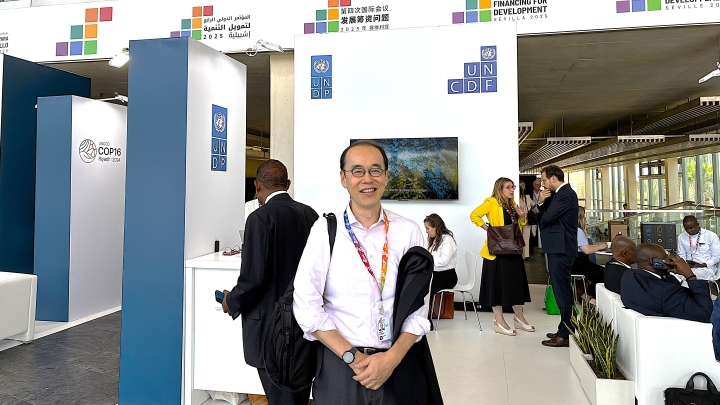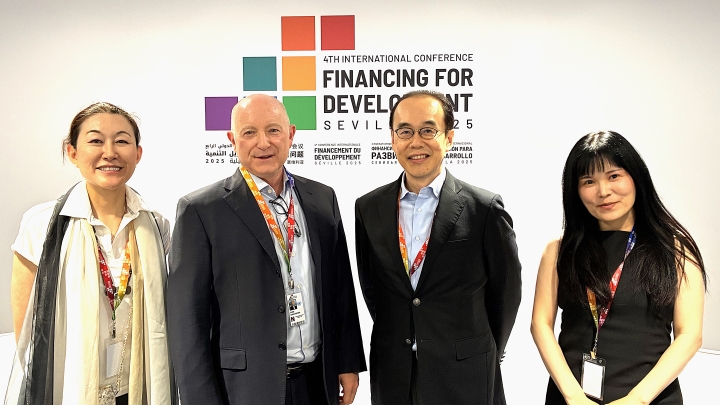The Promise of Sevilla

2025.08.06
-

- Vice President Hitoshi Hirata
4th International Conference on Financing for Development (FfD4) held in Sevilla was filled with positive energy to bridge the annual 4 trillion dollars development financing gap by all means possible, despite decrease in ODA, and to achieve the SDGs in the next five years.
From June 30 to July 3, 4th International Conference on Financing for Development (FfD4) was held in Sevilla, Spain. This critical event brought together over 15,000 participants, including the King and Prime Minister of Spain, representatives from more than 50 countries, the UN Secretary-General, the Presidents of the World Bank and the Asian Development Bank (ADB), and representatives from international organizations, businesses, and civil society groups. Japan sent a government delegation led by Parliamentary Secretary for Foreign Affairs, along with representatives from private companies including Mizuho Bank. I also attended on behalf of JICA.

Mr. Hirata at FfD4
I had been concerned that the absence of the United States might lead to a stagnant atmosphere at FfD4.However, the conference was instead brimming with positive energy. Despite the challenging times, there was a collective desire to advance new solutions and collectively expand development funding and its outcomes with like-minded partners.
The outcome document, titled “Sevilla Commitment” was a direct response to the escalating global challenges of recent years. These include the pandemic, and ensuing fiscal crisis, rising debt, climate change, and persistent poverty. The document highlighted the dire reality of a 4 trillion dollars gap between the funds needed to achieve SDGs and actual investment, which is significantly delaying SDGs attainment.
Partner countries, particularly hard-hit by the surge in food and energy prices following the pandemic, have seen poverty expand. This has increased the financial resources required to achieve SDGs. Furthermore, inflation and rising interest rates have worsened their debt burdens. The proportion of government budgets allocated to debt repayment in these developing countries has surged, leading to growing concerns about the shortage of funds for essential infrastructure investment and economic development.
Just before FfD4, Organization for Economic Co-operation and Development (OECD) announced a projected 9% year-on-year decrease in Official Development Assistance (ODA) from OECD Development Committee member countries in 2025. For countries with fragile fiscal foundations that heavily rely on ODA, this decrease will have a significant impact.
A growing concern for so called Global South is that many of these nations are now grappling with social issues such as aging populations, challenges that OECD member countries faced much later in their economic development. The pace of aging in Latin American countries such as Costa Rica and Mexico is projected to be as fast as, or even faster than, that of Japan. Amidst the looming demographic shift, there were intense discussions on how to achieve economic development and implement aging measures while securing the necessary funds.

FfD4 participants and Mr. Hirata
Faced with increasingly complex and difficult challenges, FfD4 outlined the following three responses.
(1)Mobilize All Available Funds and Expand Innovative Funding Methods.
Despite a 4 trillion dollars gap for SDGs, global financial assets total approximately 500 trillion dollars. If just 1% of this could be redirected toward solving social issues, the funding gap would be eliminated. Discussions focused on expanding “impact investing” which aims to achieve both social issue resolution and economic returns, as well as funding methods that combine public and private funds. The significant participation of private financial institutions underscores this trend.
In addition, given the limited fiscal budgets of developing countries, the role of public development banks (PDBs) has gained considerable attention. The importance of such institutions issuing bonds and engaging with the market to improve their governance was also emphasized.
(2) Use Limited Funds Effectively to Achieve Better Outcomes.
Another key discussion point was how to leverage data and establish evidence-based policies to maximize outcomes with limited sources. Examples of outcome-based finance, where funds are disbursed based on results, also garnered significant interest.
(3) Form Partnerships and Never Stop Improving.
Both partner and OECD member countries launched platforms on various themes, facilitating the sharing of best practices and discussions on improvement measures. The proactive leadership of partner countries in seeking more effective methods significantly contributed to the conference’s positive atmosphere.
A striking observation was the heightened willingness of so-called Global South, against a backdrop of crisis, to pursue new reforms on its own initiative. European countries, impact investors, and private financial institutions are responding keenly to this new movement.
Japan is also actively contributing to this effort by mobilizing private funds and expanding the capital markets of partner countries through ODA. In April, JICA Law was revised, enabling JICA to broaden its activities beyond investing in private sector projects. Now, JICA can also purchase bonds and provide debt guarantees for partner institutions and companies and offer outcome-based loans. Attendees at the conference welcomed JICA's expanded efforts to contribute to both private sector mobilization and domestic resource mobilization in recipient countries, as well as its focus on outcome-focused activities. At this pivotal moment of significant transformation in development financing, Japan is well-prepared to expand collaboration with various partners, including private companies, to demonstrate concrete results and fulfill the commitments made in Sevilla.
scroll